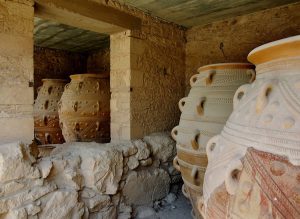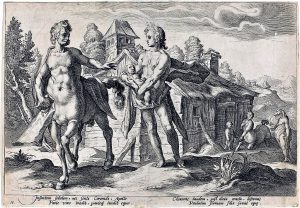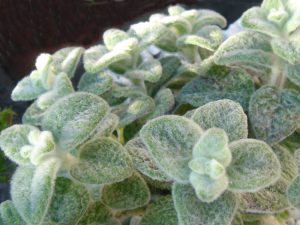On Crete, many rare herbs grow in wild meadows or beneath the trees, and some cling precariously to the sheer rock cliffs deep in the mountains. Some of these plants are indigenous only on Greece’s largest island and nowhere else on Earth. One of these rare plants may hold secrets well hidden by the gods over time. We believe a legend offers clues as to the source of creation, life, and rebirth. Now that you are interested, let me share a myth with you.
A Miracle of Keftiu
It was a shimmering Summer day, and Glaucus was playing blissfully with a ball one of the athletes had given him. Tossing and kicking his toy in and out of the columns of the palace temple, the son of King Minos was a picture of Keftiu health, beauty, and vitality. At length, the colorful ball dropped out of sight. Glaucus raced to retrieve it, down a stairway into the enormous storerooms where olive oil, wine, and honey were stored in huge vases or Pithoi. Glaucus pranced down the stairs into the cellar to fetch his ball, and he met the most peculiar sight there.


After a short tour of the temple, Polyidus saw a strange owl driving bees away from one of Minos’ storage cellars. Descending the damp storeroom stairs, he observed the spilled honey, the ball, and Glaucus’ body inside the pithoi. Minos was overjoyed that his son was finally discovered. Since the Oracle prophesied whoever found him would restore him, the king of the Keftiu demanded Polyidus restore his son to life. The seer protested that he did not have such power, so the Keftiu king locked Polyidus in the cellar with his dead son until he fulfilled the prophecy.
It wasn’t long after the storeroom was bolted shut that a snake appeared between the lifeless body of Glaucus and the seer. Startled, Polyidus killed the serpent with a sword left in the cellar with him. Then, a few minutes later, the strangest thing happened. A second snake appeared in the dim torchlight of the basement. Seeing its mate dead, the second snake retreated into the shadows. After a short time, it reemerged, carrying a strange herb, which brought its mate back to life. So, following the snake’s example, Polyidus used the same herb to resurrect Prince Glaucus.
Gifts of Paradise
The story of Polyidus and Glaucus has been the subject of many myths and legends. It was the subject of a lost play of Euripides, his Bellerophon, and of one by Aeschylus’ and Sophocles’ lost The Mantises. Today, there is a scant mention of this beautiful story. No one has tried to associate the rare herb, the incantations, or any of the other variables Polyidus might have used to bring the dead back to life. I cannot fathom why this is so, given the gravity and meaning of the story. What it? The possibility hammers in my brain each time I recall this fantastic tale. And the herb, the honey, some incantation as yet unknown, begs the ultimate question, “Is a reawakening possible?” And what of eternal life, as was the gift of the Garden of Eden? You may be surprised by new evidence.

The Dittany herb that grows wild in Crete, is currently only suggested (PDF) by the European Medicines Agency as a remedy for the relief of cough from colds and mild disorders of the stomach. In medieval times the herb indigenous to Crete island was used to treat everything from epilepsy to fevers and menstrual cramps. Today, scientists are studying (PDF) Carvacrol, which is “a monoterpenic phenol produced by the herb for biological and pharmacological properties as an antioxidant, antibacterial, antifungal, anticancer, anti-inflammatory, hepatoprotective, spasmolytic, and a vasorelaxant.” Furthermore, other clinical studies suggest Cretan dittany’s high amount of carvacrol and rosmarinic acid inhibited the growth of specific colon cancer cells by as much as 95%. It’s also been found out that the phenols also exhibited an antiproliferative effect. Dictamnus essential oil also has a very high antimicrobial, antioxidant, and antiproliferative value. Stil, no studies I’ve found have combined Dictamnus’ important compounds with other components. And discussion of ritual performances such as might have occurred during the resurrection of Glaucus is rare.
Cosmic Circles
Well then, myth looks more like history. And Keftiu’s secrets draw closer to those who passionately inquire and search.

